 Sharpening the Sword is a weekly column by retailer John Riley of Grasshopper's Comics, a 1,300 square foot comic and games store in Williston Park, New York. This week, Riley looks at the changes being made by the nation’s largest book retailer, and why they don’t make sense, even in the midst of a digital onslaught.
Sharpening the Sword is a weekly column by retailer John Riley of Grasshopper's Comics, a 1,300 square foot comic and games store in Williston Park, New York. This week, Riley looks at the changes being made by the nation’s largest book retailer, and why they don’t make sense, even in the midst of a digital onslaught.A few days ago I went shopping in my local Barnes & Noble. The store was just built about two years ago and is a giant building attached to the largest mall in the county. It has two floors, a cafe, music and DVD sections, etc. I was browsing for gifts for my wife's birthday and also there to do a little research for my novel, check out the displays, read book jackets, etc.
But all that changed the moment my daughter and I stepped foot in the store. We immediately stopped, turned to each other, and simultaneously asked, “where's the books?”
Apparently, B&N decided to do a major shakeup at this store. On the first floor books had been removed from an entire side of the building and in their place was gift-wrapping, cards, invitations, and for lack of a better description, party goods. Now I know that wasn't their definition of what was there, but I came to look at books, so in my mind it was primarily party goods.
The book displays at the front of the store had been replaced with a very large display of Nook ereaders, with a dedicated staff to teach people how to use them. That left only about 20% of the first floor for actual books, the majority of which were displayed in well-arranged piles on various display tables. While all of these displays were well designed, they all featured the same “mega-authors.” James Patterson sat on at least 60% of the tables, as did Jodi Picoult, David Baldacci, etc. There were quite a few displays, but they were all selling the same few authors. The only actual book “section” on the first floor was dedicated entirely to “Teen Paranormal Romance,” with hundreds of books aimed at milking a few more dollars out of Twilight fans.
A bit dazed and confused we decided to head upstairs to where the books surely must have gone. But when we got there we found that around 60% of the display space for books had been replaced with games and puzzles, leaving the only real books on the floor to be in the young children's section or in the “stacks” crammed into the rear quarter of the store.
Now this all seemed strangely familiar, because it was the same strategy Blockbuster embarked on prior to their implosion. Blockbuster was an aggressive innovator when they were growing the company, with their primary advantage being proprietary software to manage their inventory. As they got bigger they leveraged their size to get exclusive relationships with movie studios. But once they had succeeded in dominating the industry their “innovations” were aimed not at improving the customer experience but at wringing more profit out of the business. When Netflix, a disruptive innovator, came along to serve the customer better by side-stepping the retail storefront, suddenly Blockbuster stores had everything from books to magazines to framed posters as they tried to gain ancillary sales and continued to ignore their core movie rental business.
B&N seems headed down the same road. We all know sales on physical books aren't great, so they figure they'll sell other product lines. But what both of these companies apparently fail to comprehend is that as a customer that's not why I walked into their store.
I go to bookstores because I like to browse books. If I know the exact book I want its easy enough to order it from Amazon from my couch. But when I don't, I like to browse bookstores, look at all the various displays and get ideas. Browsing reminds me of interests I have that I sometimes forget about. It's fun to “discover” an interesting book.
Essentially, I go to bookstores when I don't know what I want, and present them the opportunity to sell something to me. But if they fail to take advantage of that opportunity, then there's really no point in me going. As they condense their inventories further and further they eliminate their primary allure.
In our stores we need to not only avoid making the same mistake, but capitalize on theirs. As they cut back dramatically on their graphic novels, we gain strategic advantage. Essentially we're very specialized bookstores, so we can be extremely well stocked in a very targeted niche. We can take advantage of our ability to make recommendations, cross sell, and make readers aware of new titles or creators. I know that a good percentage of our customers come in to discover new stories. They want to discuss books they like and get turned on to new ones. They want the interaction, to have their interests validated, to have a social experience of discovery. And the more the big box stores abandon their core business the more opportunity we have to satisfy these needs.
Despite the tidal wave of digital, print isn't going anywhere soon or permanently. Just yesterday I had a new customer come in to order the newest volume in a series of books that she had been reading digitally. Why would she do this? Because she figured she had enjoyed the first few volumes enough that it was time to actually own them. We still have opportunities out there, but we need to focus on our core business, introducing people to great comics and games.
Next time, we'll steal some great ideas from a bookstore that is almost guaranteed to be the “last man standing.”
The opinions expressed in this column are solely those of the writer, and do not necessarily reflect the views of the editorial staff of ICv2.com.







